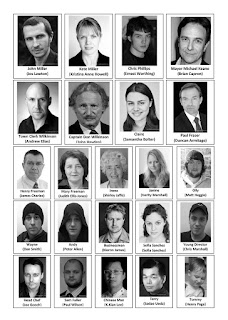 By Dan Parkes (Director)
By Dan Parkes (Director)Some think auditions are intimidating. In my experience in both attending and holding auditions I have found that they can be quite the opposite. In fact auditions that are relaxed and fun are often more productive. Here are some great tips for both filmmakers and actors....
Filmmaker tips:
- Take it seriously; auditions and casting can make or break a film.
- Hold auditions in a large space with a waiting area outside if able.
- Audition local actors to save on transportation costs, and assist with these if able.
- If an actor is quite a distance, on-line or video auditions can save much time and money.
- Narrow down the selection prior to the actual audition so you can focus on the strongest candidates.
- Prepare well -have a well thought out schedule with breaks, and biographical information on each actor.
- Provide glass of water for each actor.
- Always film auditions -actors respond and look different through a lens and can be used for later reference.
- Take notes during the actual audition on impressions or thoughts that you may forget later.
- Leave at least five minutes between each audition to immediately discuss thoughts and reactions with the rest of your team.
- Keep it as relaxed as possible; rather than an interrogation, have a conversation with the actor.
- Do not spend a large amount of time selling the film concept or potential to an actor, unless the actor asks about it. Time is better spent seeing what the actor can do on camera.
- If possible, give actors a short character description prior to the audition as this will help them prepare better.
- Have an appropriate scene from the script that can be performed and if possible send it to the actor prior to the audition.
- Provide some relevant furniture or props.
- If able allow for improvisation so an actor can show their potential in the role.
- Always use an experienced actor to play other parts (or as a reader), as this will impact on the quality of the audition.
- If the role involves something extra (such as cutting their hair, or stunt work etc) this is the time to ask -not after they have been cast! Your decision could be greatly affected if they are unable or unwilling.
- Never cast actors based on just personality or what they 'might be able to do'; the decision must be made based on what you have seen them do on camera and if this is right for the character.
- Even if an actor is not right for the role, keep an open mind -are they right for another character not yet cast?
- While rejection is part of being an actor, wherever possible give positive feedback and at the very least let them know when they have not got the part within a week or so.
 Actor tips:
Actor tips:- Be positive; see every audition as not only a chance to be cast, but an opportunity to be seen by those who may remember you later.
- Always have some questions to ask the team (and not just about money or conditions) -you at least should show some interest in the production.
- If you have not been cast for some time do not allow any bitterness to show; filmmakers do not want to cast a disgruntled actor.
- If you do not get the role, remember that this is not a reflection on your acting abilities, but most likely that you were not right for the role.
- If you communicate well in person and by mobile phone/e-mail, filmmakers will likely feel more confident to cast you.
- If you have been given a scene from the script, bring a prop if possible to assist with your performance.
- If you have an opportunity to be a reader for an audition -do it! This allows you to see what works and what doesn't from a safe position. And you may be cast in the film itself!
- Finally, remember, the filmmakers are the ones who should be nervous, as they have the most difficult task, not you, so relax!





